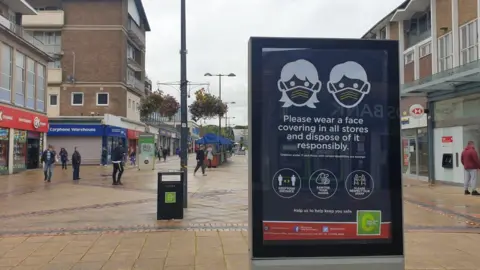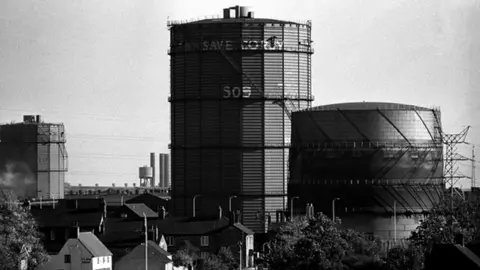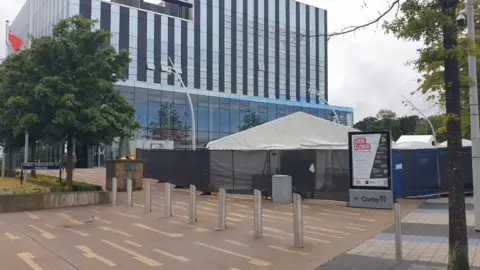Coronavirus: Why have cases spiked in Corby?
 BBC
BBCCorby has risen up the rankings of English towns and cities for new coronavirus cases, with many found in younger people. Why has the Northamptonshire town become a hotspot?
What do we know about the Corby outbreak?
Corby has the fifth highest rate of new cases per 100,000 people in English towns and cities, according to latest figures.
In the week up to 30 August, the rate of new cases in the town stood at 54 per 100,000 people.
That's up from just under 21 per 100,000 the week before.
Other places with the most new cases are generally in the north of England, with Pendle in Lancashire topping the list with 133.5 cases per 100,000 residents.
Unlike nearby Northampton, which recorded a surge in cases following an outbreak at sandwich-making factory Greencore, there is no single workplace that could be linked to the spike.
The rise in Corby is down to two days with high numbers of cases - 13 on 25 August and 10 on August 26.

There have been no Covid-related deaths in the town.
Lucy Wightman, Director of Public Health Northamptonshire, said many of the new cases were found in young people.
"It is a younger age group, between 25 and 29, and up to 35," she said.
"People who are more likely to be going out and about, and socialising."
Public Health Northamptonshire also said there is a 70/30 split in favour of women among the new cases, with a link to care work being examined.
Why is coronavirus affecting young people in Corby?
Corby, with a population of about 72,000, is known as 'Little Scotland' - a reference to when scores of Scots migrated south to work in the steelworks in the 1930s.
That industry closed more than 40 years ago and these days it is a town of coffee shops, bars and restaurants - all named by Mrs Wightman as being among areas where "a lot of transmissions seems to be happening".
 PA
PAIt is not the only place to have seen an increase in cases among young people, with almost half of the cases reported in Preston relating to those aged 30 and under.
Nevertheless, Mrs Wightman admitted there has been some "difficulty unpicking" the Corby data.
"There is soft intelligence to say where people have started to attend gyms and amateur football matches, that they are car sharing beforehand and potentially socialising together afterwards," she said.
"Although they are maintaining social distancing in Covid secure environments, there is some element, potentially, of that socialisation playing a part."

Conservative Corby MP Tom Pursglove said it was a balancing act.
"There are risks with any form of activity, whether sports, the pub or children going to school.
"People need to follow the advice, be considerate and look out for others.
"But equally, I can understand why people want to live their lives."
What do people in the town say?
Stephen Hiskins, 64, a town centre meat trader, said some people were ignoring guidelines.
"I've seen people shaking hands kissing and people without masks," he said.
"One of the problems is people going into shops without masks and the shops can't enforce it."

Corby Town Centre Manager Dan Pickard said he has not seen "anything obvious" leading to the increase, adding the number of cases of people breaking social distancing and other guidelines has fallen.
"I'm pleasantly surprised at the level of compliance and the level of face coverage usage," he said.

Could this lead to a local lockdown?
The rate of new cases is one of the main things the government takes into account when making decisions on local lockdowns.
However, in Northampton measures such as households being told to stop meeting up or businesses closing were avoided despite it topping a government watchlist, with 117 cases for every 100,000 residents.

Northampton was named an 'area of intervention' and production ceased temporarily at Greencore, but a local lockdown has been avoided.
That was partly down to the localised nature of the outbreak as opposed to the more sporadic cases in Corby.
Mrs Wightman said a local lockdown was not out of the question.
"I don't believe we are at that point yet, but I would be surprised if the chief medical officer isn't watching us carefully," she said.
Mr Pickard said that would be the last thing anyone wanted.
"It makes me nervous," he said. "The measures for people and for businesses are horrendous."

- SOCIAL DISTANCING: What are the rules now?
- FACE MASKS: When do I need to wear one?
- SOCIAL LIFE: Is it safe to go to the pub?
- LOCAL LOCKDOWNS: What happens if you have one?
- TEST AND TRACE: How does it work?

Find BBC News: East of England on Facebook, Instagram and Twitter. If you have a story suggestion email [email protected]
